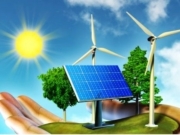Such a production volume would cover the average consumption of nearly 37,000 households for an entire year.
Aavo Kärmas, Chairman of the Management Board of Enefit Green, assessed April’s electricity output as very good. "We cannot control the wind conditions, but we can increase the reliability of wind turbines and we strive for it every day. The digital collection and analysis of production data has played a role in increasing reliability," Kärmas commented.
Kärmas highlighted as the most positive aspect the market trend that supports the further development of wind energy, concluded long-term renewable energy purchase agreements with companies across the Baltic States. "Contracts sold in advance accelerate Enefit Green's growth plans. It is a pleasure to see that more than a hundred companies have taken a step towards a cleaner future," Kärmas said.
The 112 gigawatt-hour productivity for April includes not only Estonian and Lithuanian wind farms, but also the production volumes of solar parks in Estonia and Poland Iru, Paide, Valka and Broceni CHP plants, the Keila-Joa hydroelectric power plant, and the Ruhnu renewable energy solution.
Enefit Green’s heat production in the Iru and Paide cogeneration plants in Estonia and Latvia was 48 gigawatt-hours.
In total, Enefit Green has produced 413 gigawatt-hours of electricity and 224 gigawatt-hours of heat in the first four months of this year.
Enefit Green is a company that belongs to the group of Eesti Energia, currently owning a total of 20 wind farms in four markets – Estonia, Latvia, Lithuania, and Poland, as well as 4 CHP plants, 36 solar power plants, a pellet plant, and a hydroelectric power plant.


